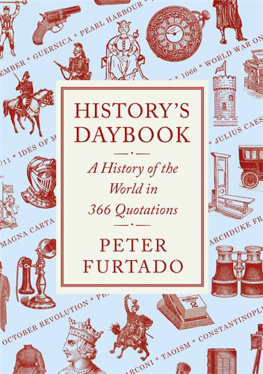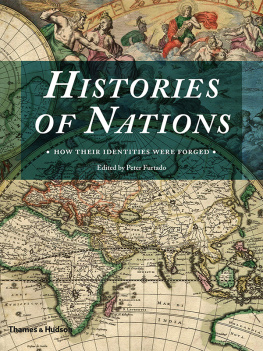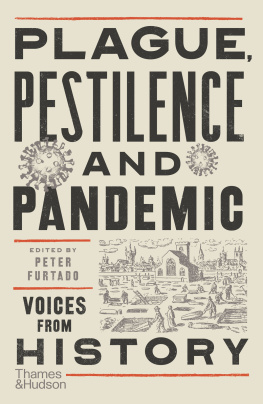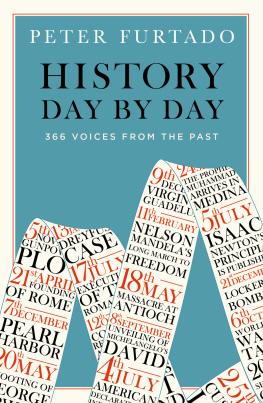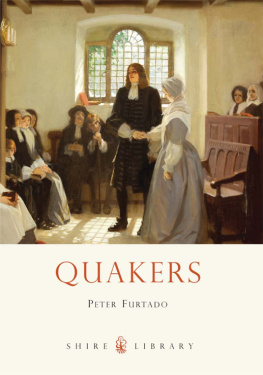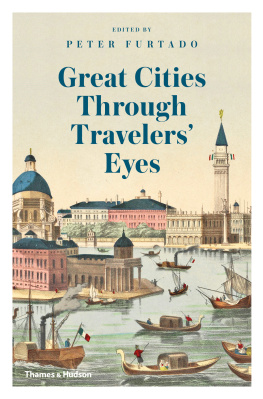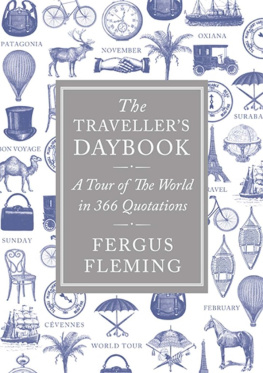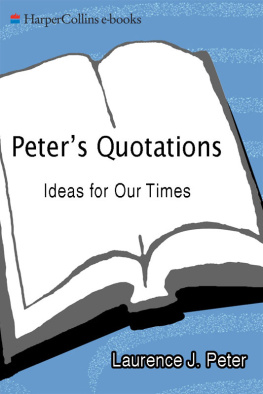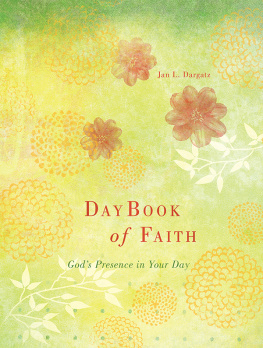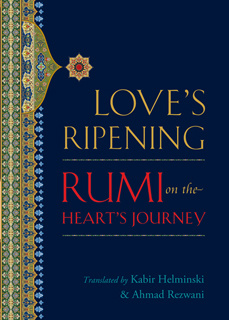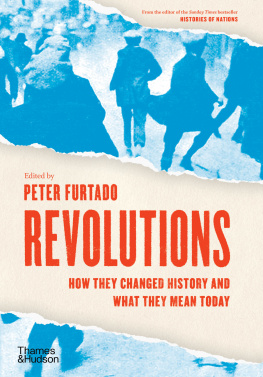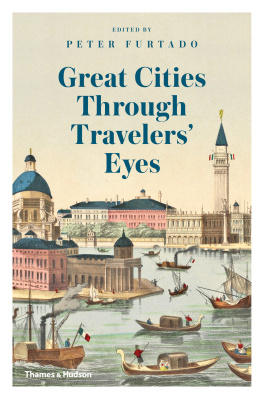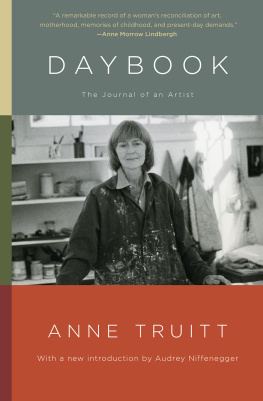Peter Furtado - Historys Daybook: A History of the World in 366 Quotations
Here you can read online Peter Furtado - Historys Daybook: A History of the World in 366 Quotations full text of the book (entire story) in english for free. Download pdf and epub, get meaning, cover and reviews about this ebook. year: 2011, publisher: Atlantic Books, genre: Detective and thriller. Description of the work, (preface) as well as reviews are available. Best literature library LitArk.com created for fans of good reading and offers a wide selection of genres:
Romance novel
Science fiction
Adventure
Detective
Science
History
Home and family
Prose
Art
Politics
Computer
Non-fiction
Religion
Business
Children
Humor
Choose a favorite category and find really read worthwhile books. Enjoy immersion in the world of imagination, feel the emotions of the characters or learn something new for yourself, make an fascinating discovery.
- Book:Historys Daybook: A History of the World in 366 Quotations
- Author:
- Publisher:Atlantic Books
- Genre:
- Year:2011
- Rating:5 / 5
- Favourites:Add to favourites
- Your mark:
- 100
- 1
- 2
- 3
- 4
- 5
Historys Daybook: A History of the World in 366 Quotations: summary, description and annotation
We offer to read an annotation, description, summary or preface (depends on what the author of the book "Historys Daybook: A History of the World in 366 Quotations" wrote himself). If you haven't found the necessary information about the book — write in the comments, we will try to find it.
Historys Daybook: A History of the World in 366 Quotations — read online for free the complete book (whole text) full work
Below is the text of the book, divided by pages. System saving the place of the last page read, allows you to conveniently read the book "Historys Daybook: A History of the World in 366 Quotations" online for free, without having to search again every time where you left off. Put a bookmark, and you can go to the page where you finished reading at any time.
Font size:
Interval:
Bookmark:

First published in Great Britain in 2011 by Atlantic Books,
an imprint of Atlantic Books Ltd.
Copyright in the selection of extracts, editorial notes, On this Day entries and Chronology Peter Furtado, 2011
The moral right of Peter Furtado to be identified as the author of this work has been asserted by him in accordance with the Copyright, Designs and Patents Act of 1988.
All rights reserved. No part of this publication may be reproduced, stored in a retrieval system, or transmitted in any form or by any means, electronic, mechanical, photocopying, recording, or otherwise, without the prior permission of both the copyright owner and the above publisher of this book.
The permissions to quote from material in copyright contained on this form part of this copyright page.
Every effort has been made to trace or contact all copyright holders. The Publishers will be pleased to make good any omissions or rectify any mistakes brought to their attention at the earliest opportunity.
All images are courtesy of iStock, Shutterstock, Library of Congress or public domain.
1 2 3 4 5 6 7 8 9 10
A CIP catalogue record for this book is available from the British Library.
ISBN: 978 1 84887 670 5
eISBN: 978 0 85789 927 9
Designed by carrstudio.co.uk
Printed in Great Britain
Atlantic Books
An Imprint of Atlantic Books Ltd
Ormond House
2627 Boswell Street
London
WC1N 3JZ
www.atlantic-books.co.uk

Some of the best historical quotations, like the best stories, improve in the telling. Martin Luther did not tell the Diet of Worms in 1521, Here I stand; I can do no other, but spoke much less pithily. Marie Antoinette did not say in 1789 Let them eat cake (these words in fact appear in an anecdote in the Confessions of Jean-Jacques Rousseau). It was a British tabloid headline writer, not the then prime minister James Callaghan, who came out with Crisis, What Crisis? during Britains winter of discontent of 19789. And the Chinese premier Zhou Enlai never suggested to the US secretary of state Henry Kissinger in 1972 that it was too early to tell what might be the impact of the French Revolution he was actually referring to Frances vnements of May 1968.
Misquotations, as much as true quotations, can act as what the biologist Richard Dawkins called memes heritable units of cultural memory encapsulating a hinterland of knowledge, each one competing for our attention. The capacity of quotation to bear this weight of meaning is, perhaps, just one good reason among several for a collection of excerpts describing or reflecting on notable events in the past, and placed in their historical context.
Historys Daybook offers a genuine quotation from or about history for every day of the calendar year. Each quotation consists of words actually spoken on that day, or relating to events that took place on it. Some of the quotations refer to famous or notorious anniversaries 6 June, 1 July, 14 July, 11 September, to name but a few others to less immediately familiar but still significant events, from the ancient world to the twenty-first century.
Historys Daybook includes some the most celebrated of all historical quotations, from Caesars cry of Alea iacta est! as he crossed the River Rubicon in 49 BC, to Marxs and Engels Workers of the world, unite! in The Communist Manifesto of 1848. But here I present these words in the larger context in which they were originally placed. The sound-bites of history may be memorable, but they become far more revealing when their preceding and succeeding paragraphs are also read, and when their historical context is fully understood.
As an anthology of original source materials some of them key documents, others the reports of eyewitnesses, or written shortly after the event Historys Daybook offers a shortcut to the heart of history. Diary entries and memoirs, letters and interviews, bons mots and sound-bites, narratives and journalistic accounts, speeches and sermons, official reports and briefings; the entries selected are as wide-ranging in form as they are in geography and timescale. In some cases two disparate accounts throw contrasting light on the same happening. They are limited only by the need to pin the event or the quote to a specific date in the calendar.
It is important to add a health warning: not every entry in Historys Daybook should be taken at face value. Some of the statements here are self-serving, others deluded. And some may be accurate as far as they go, but are still partial accounts that more recent historians have reassessed in the light of a fuller understanding of their historical context. Yet as the raw material of history they remain vital and fascinating. The great British scholar G.M. Young once advised young historians to Read until you can hear the people talking and it is my hope that the 366 extracts in Historys Daybook provide a wealth of opportunities to do just that.
Peter Furtado
Oxford
August 2011


THE DEBUT OF THE TIMES, 1785

To the Public
To bring out a new paper in the present day, when so many others are already established and confirmed in the public opinion, is certainly an arduous undertaking; and no-one can be more fully aware of its difficulties than I am; I, nevertheless, entertain very sanguine hopes that the nature of the plan on which this paper will be conducted will ensure it a moderate share at least of public favour; but my pretensions to encouragement, however strong they may appear in my own eyes, must be tried before a tribunal not liable to be blinded by self-opinion; to that tribunal I shall now, as I am bound to do, submit these pretensions with deference, and the public will judge whether they are well or ill founded.
...A paper that... by steering clear of extremes, hit the happy medium, has long been expected by the public. Such, it is intended, shall be the UNIVERSAL REGISTER, the great objects of which will be to facilitate the commercial intercourse between the different parts of the community through the channel of advertisements, to record the principal occurrences of the times, and to abridge the account of debates during the sitting of Parliament.
E DITORIAL , D AILY U NIVERSAL R EGISTER , 1 J ANUARY 1785.

The former underwriter John Walter launched his newspaper, under the title Daily Universal Register, on the first day of 1785. Exactly three years later he renamed it The Times and broadened its appeal to include society gossip, something that landed him in Newgate Prison for two years after libelling the Prince of Wales. By the 19th century its independent viewpoint and innovative technology had made it the leading newspaper in Britain, campaigning for Parliamentary Reform before 1832, and for army reform during the Crimean War of 18546, a conflict that showcased the journalism of
Font size:
Interval:
Bookmark:
Similar books «Historys Daybook: A History of the World in 366 Quotations»
Look at similar books to Historys Daybook: A History of the World in 366 Quotations. We have selected literature similar in name and meaning in the hope of providing readers with more options to find new, interesting, not yet read works.
Discussion, reviews of the book Historys Daybook: A History of the World in 366 Quotations and just readers' own opinions. Leave your comments, write what you think about the work, its meaning or the main characters. Specify what exactly you liked and what you didn't like, and why you think so.

